

How English Evolved Into a Modern Language. History of English (combined) LEGO History of the English Language. The Story of English episode 7 - Muvver Tongue - Part 1 / 7. Chronology: History of English. Language Timeline. The English language is a vast flea market of words, handed down, borrowed or created over more than 2000 years.
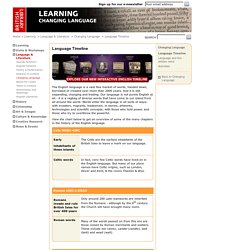
And it is still expanding, changing and trading. Our language is not purely English at all - it is a ragbag of diverse words that have come to our island from all around the world. Words enter the language in all sorts of ways: with invaders, migrants, tradesmen; in stories, artworks, technologies and scientific concepts; with those who hold power, and those who try to overthrow the powerful. Etymology: Languages that have contributed to English vocabulary over time. In Borrowed Words: A History of Loanwords in English, I examine how words borrowed from different languages have influenced English throughout its history.
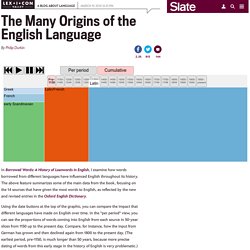
The History of the English Language ( Visual) Do you speak Uglish? How English has evolved in Uganda. Please don’t dirten my shirt with your muddy hands.

Stop cowardising and go and see that girl. Don’t just beep her again, bench her. Typos? No, we’re speaking Uglish (pronounced you-glish), a Ugandan form of English influenced by Luganda and other local dialects, which has produced hundreds of words with their own unique meanings. Some will be immediately obvious to English speakers: dirten, meaning to make dirty; cowardising, to behave like a coward. Others offer small insights into youth culture: beep – meaning to ring someone but to hang up quickly before the person answers. Now, Bernard Sabiti, a Ugandan cultural commentator has recorded these colloquialisms in a new book which attempts to unlock what he calls “one of the funniest and strangest English varieties in the world”. Working as a consultant for international NGOs, Sabiti kept being asked “what kind of English do Ugandans speak?”
The evolution of the English language. 25 maps that explain the English language. English is the language of Shakespeare and the language of Chaucer.
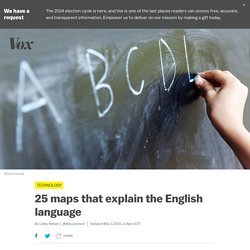
It’s spoken in dozens of countries around the world, from the United States to a tiny island named Tristan da Cunha. It reflects the influences of centuries of international exchange, including conquest and colonization, from the Vikings through the 21st century. Here are 25 maps and charts that explain how English got started and evolved into the differently accented languages spoken today. The origins of English 1) Where English comes from English, like more than 400 other languages, is part of the Indo-European language family, sharing common roots not just with German and French but with Russian, Hindi, Punjabi, and Persian. 10 Letters We Dropped From The Alphabet. The History of English (An Overview) English language 'originated in Turkey' Modern Indo-European languages - which include English - originated in Turkey about 9,000 years ago, researchers say.
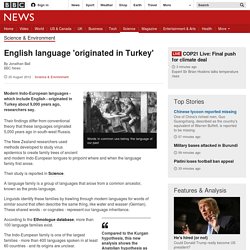
Their findings differ from conventional theory that these languages originated 5,000 years ago in south-west Russia. The New Zealand researchers used methods developed to study virus epidemics to create family trees of ancient and modern Indo-European tongues to pinpoint where and when the language family first arose. Their study is reported in Science. A language family is a group of languages that arose from a common ancestor, known as the proto-language. Linguists identify these families by trawling through modern languages for words of similar sound that often describe the same thing, like water and wasser (German). According to the Ethnologue database, more than 100 language families exist. The Indo-European family is one of the largest families - more than 400 languages spoken in at least 60 countries - and its origins are unclear.
How the internet is killing off silent letters. Professor David Crystal says people drop letters when typing them into search engines He says the internet will influence changes in spelling in the future Academic labels the 'h' in rhubarb as 'illogical' By Daily Mail Reporter Published: 08:29 GMT, 2 June 2013 | Updated: 06:40 GMT, 3 June 2013 David Crystal, professor of linguistics of Bangor University, explained how people are dropping letters when typing words into search engines Common misspellings of English words could be acceptable within a few years because they are used online, a linguist has said.
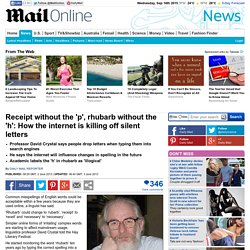
‘Rhubarb’ could change to ‘rubarb’, ‘receipt’ to ‘receit’ and ‘necessary’ to ‘neccesary’. Simpler online forms of ‘irritating’ complex words are starting to affect mainstream usage, linguistics professor David Crystal told the Hay Literary Festival. He started monitoring the word ‘rhubarb’ ten years ago by typing the correct spelling into a search engine, then the error ‘rubarb’. ‘Rhubarb is still the dominant one by a factor of 50. English Language Quizzes. The differences between English and other language. Origin of the English Language. The origins of the English language have been explored by many scholars, and the evolution from English’s roots to today’s modern tongue has been heavily documented.
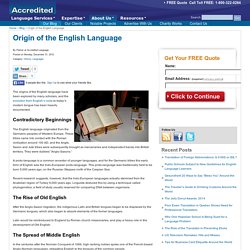
Contradictory Beginnings The English language originated from the Germanic peoples of Western Europe. These tribes came into contact with the Roman civilization around 100 AD, and the Angle, Saxon and Jute tribes were subsequently brought as mercenaries and independent bands into British territory. They were dubbed “Anglo-Saxons.”